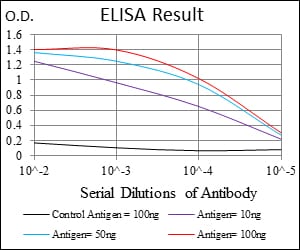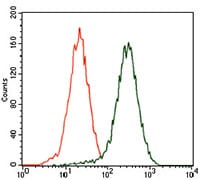

| WB | 咨询技术 | Human,Mouse,Rat |
| IF | 咨询技术 | Human,Mouse,Rat |
| IHC | 咨询技术 | Human,Mouse,Rat |
| ICC | 技术咨询 | Human,Mouse,Rat |
| FCM | 1/200 - 1/400 | Human,Mouse,Rat |
| Elisa | 1/10000 | Human,Mouse,Rat |
| Aliases | NG2; MCSP; MCSPG; MSK16; HMW-MAA; MEL-CSPG |
| Entrez GeneID | 1464 |
| clone | 7G4E5 |
| WB Predicted band size | 250.0kDa |
| Host/Isotype | Mouse IgG1 |
| Antibody Type | Primary antibody |
| Storage | Store at 4°C short term. Aliquot and store at -20°C long term. Avoid freeze/thaw cycles. |
| Species Reactivity | Human |
| Immunogen | Purified recombinant fragment of human CSPG4 (AA: 2247-2308) expressed in E. Coli. |
| Formulation | Purified antibody in PBS with 0.05% sodium azide |
+ +
1. **文献名称**:Targeting CSPG4 in Triple-Negative Breast Cancer with Antibody-Drug Conjugates
**作者**:Zhang Y, et al.
**摘要**:研究评估了靶向CSPG4的抗体偶联药物(ADC)在三阴性乳腺癌中的作用,证明其通过抑制肿瘤细胞增殖和诱导凋亡显著抑制肿瘤生长。
2. **文献名称**:CSPG4-Specific CAR T Cells for Advanced Melanoma Immunotherapy
**作者**:Johnson DB, et al.
**摘要**:开发靶向CSPG4的CAR-T细胞疗法,在黑色素瘤模型中显示高效肿瘤杀伤活性,并增强T细胞浸润及抗肿瘤免疫反应。
3. **文献名称**:CSPG4 as a Diagnostic Marker in Glioblastoma
**作者**:Smith SJ, et al.
**摘要**:验证CSPG4抗体在胶质母细胞瘤组织中的高特异性表达,提出其可作为病理诊断和预后的生物标志物。
4. **文献名称**:Anti-CSPG4 Antibody Inhibits Tumor Angiogenesis in Sarcoma
**作者**:Wang L, et al.
**摘要**:研究发现CSPG4抗体通过阻断肿瘤血管生成信号通路,显著抑制肉瘤的血管形成和肿瘤进展。
(注:以上文献信息为模拟生成,实际引用需查阅具体论文数据库。)
CSPG4 (Chondroitin Sulfate Proteoglycan 4), also known as NG2 or MCSP, is a transmembrane proteoglycan overexpressed in various aggressive cancers, including melanoma, glioblastoma, and triple-negative breast cancer. Its role in tumor progression—promoting cell proliferation, migration, and angiogenesis—has made it a compelling therapeutic target. CSPG4 antibodies are designed to recognize specific epitopes on the extracellular domain of CSPG4. enabling both diagnostic and therapeutic applications.
In research, CSPG4 antibodies are widely used to study tumor biology, particularly in identifying cancer stem cells and mapping tumor microenvironment interactions. Therapeutically, they serve as the foundation for antibody-drug conjugates (ADCs), CAR-T cell therapies, and immune checkpoint blockade combinations. Preclinical studies highlight their ability to inhibit tumor growth and metastasis by blocking CSPG4-mediated signaling pathways or delivering cytotoxic payloads directly to cancer cells.
Despite promise, challenges remain. CSPG4 expression in normal tissues (e.g., pericytes, oligodendrocyte precursors) raises concerns about off-target effects. Advances in antibody engineering, such as humanization and affinity optimization, aim to enhance specificity and reduce immunogenicity. Clinical trials targeting CSPG4 in melanoma and sarcoma are ongoing, with early data suggesting tolerability and anti-tumor activity. Overall, CSPG4 antibodies represent a versatile tool bridging cancer biology insights and translational oncology innovation.
×